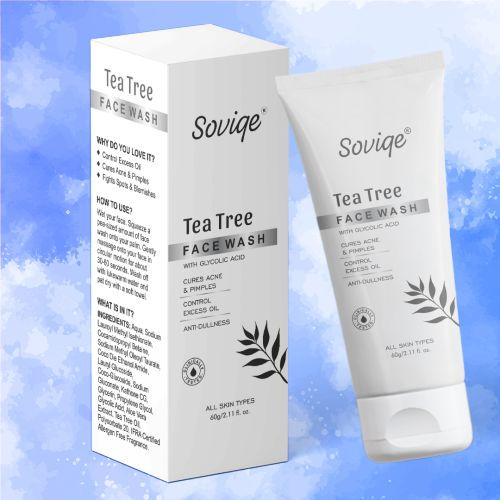Which Skin Types Are Best Suited for Tea Tree Face Wash?
- Karan Kumar
- Aug 18, 2025
- 4 min read

When it comes to skincare, choosing the right face wash is often the first and most important step. The cleanser you use sets the foundation for the rest of your routine. Among the many options available, tea tree face wash has gained popularity for its natural antibacterial, anti-inflammatory, and oil-regulating properties.
But a common question people ask is: Which skin types are best suited for tea tree face wash? Since not all skin types react the same way to products, understanding how this natural cleanser works for different skin types is essential.
In this blog, we’ll explore what makes tea tree face wash special, the skin types that benefit most from it, and how to use it effectively.
What Makes Tea Tree Face Wash Unique?
The star ingredient in tea tree face wash is tea tree oil, derived from the leaves of the Melaleuca alternifolia plant native to Australia. Tea tree oil has been used for centuries as a natural remedy for cuts, infections, and skin conditions.
When used in skincare, it provides the following benefits:
Antibacterial properties – Helps kill acne-causing bacteria.
Anti-inflammatory action – Reduces redness and swelling.
Sebum regulation – Controls oil production naturally.
Deep cleansing – Removes dirt, impurities, and excess oil.
Unlike many chemical cleansers, tea tree face wash provides gentle but effective cleansing without stripping the skin of essential moisture.
Benefits of Using Tea Tree Face Wash
Before identifying the skin types best suited for tea tree face wash, let’s look at its overall benefits:
Controls excess oil and reduces shine.
Prevents breakouts and pimples.
Clears clogged pores and reduces blackheads.
Soothes irritation and calms redness.
Leaves skin feeling refreshed and rejuvenated.
These qualities make tea tree face wash a versatile product that caters to a variety of skin needs.
Skin Types Best Suited for Tea Tree Face Wash
1. Oily Skin
Oily skin is characterized by excessive sebum production, which leads to shine, enlarged pores, and frequent breakouts. Tea tree face wash is one of the best choices for oily skin because it:
Controls excess oil without overdrying.
Keeps skin matte and fresh for longer.
Reduces the chances of clogged pores and blackheads.
For oily skin types, using tea tree face wash twice daily can help maintain a balanced, grease-free complexion.
2. Acne-Prone Skin
People with acne-prone skin often struggle with frequent pimples, inflammation, and scars. Since tea tree oil is antibacterial and anti-inflammatory, a tea tree face wash works wonders in keeping acne under control.
Kills acne-causing bacteria.
Reduces redness and swelling.
Prevents new breakouts.
With consistent use, acne-prone skin can see fewer pimples and a clearer overall texture.
3. Combination Skin
Combination skin means you have both oily and dry areas on your face. Usually, the T-zone (forehead, nose, and chin) is oily, while the cheeks are normal or slightly dry. Finding a face wash that balances both areas can be difficult.
A tea tree face wash is effective because it:
Controls excess oil in the T-zone.
Cleanses without leaving dry areas irritated.
Maintains harmony between oily and normal skin zones.
This makes it a reliable option for people with combination skin.
4. Normal Skin
Normal skin is neither too oily nor too dry. While it may not have extreme issues, it still needs gentle cleansing to maintain clarity and freshness. Tea tree face wash suits normal skin because it:
Provides daily cleansing without disrupting balance.
Keeps skin clear of occasional pimples.
Refreshes and rejuvenates the face.
Normal skin types can safely use tea tree face wash to maintain a healthy and glowing complexion.
5. Sensitive Skin (With Caution)
Sensitive skin can be tricky, as it often reacts strongly to active ingredients. While tea tree face wash is natural, some people with highly sensitive skin may experience irritation if used too frequently.
It can soothe mild redness and irritation.
Works best if used only once a day or a few times a week.
Always recommended to do a patch test before regular use.
For sensitive skin, moderation is key when using tea tree face wash.
Skin Types That May Avoid Tea Tree Face Wash
Although tea tree face wash suits many skin types, it may not be the best option for everyone.
Extremely dry skin – It may feel too cleansing and could cause tightness.
Allergy-prone skin – Anyone allergic to tea tree oil should avoid it.
If you fall into these categories, a more hydrating or fragrance-free cleanser may be a better choice.
How to Use Tea Tree Face Wash Effectively
To get the maximum benefits, here’s the correct way to use tea tree face wash:
Wet your face with lukewarm water.
Apply a small amount of tea tree face wash to your palm.
Massage gently in circular motions, focusing on oily or acne-prone areas.
Rinse thoroughly and pat dry with a clean towel.
Follow up with a light moisturizer to keep your skin hydrated.
For best results, use it twice a day – morning and night.
Conclusion
So, which skin types are best suited for tea tree face wash? It is highly beneficial for oily, acne-prone, combination, and normal skin types. Sensitive skin can also benefit when used with caution, while extremely dry or allergy-prone skin should avoid it.
With its natural antibacterial, anti-inflammatory, and oil-regulating properties, tea tree face wash is a versatile and effective cleanser. It helps control excess oil, prevent acne, unclog pores, and keep the skin refreshed. If you are looking for a gentle yet powerful face wash that promotes clear and healthy skin, tea tree face wash can be the right addition to your daily skincare routine.
Comments